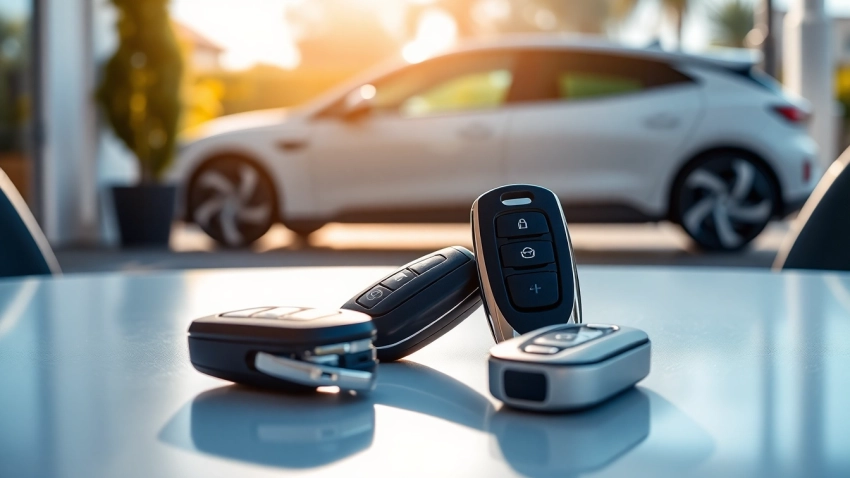
Innovative Keys for Electric Cars: A Comprehensive Guide
Understanding Keys for Electric Cars
The electrification of vehicles has transformed the automotive landscape, bringing forth advancements not only in performance and efficiency but also in how vehicles are accessed and controlled. A critical element in this evolution is the development of keys for electric cars. These keys represent a significant departure from traditional mechanical keys, incorporating various electronic technologies that enhance user experience and security. This article delves into the nuances of keys for electric cars, elucidating their functionality, types, benefits, and future trends. For those interested in a range of options available for keys for electric cars, this guide serves as a comprehensive resource.
What Are Electric Car Keys?
Electric car keys are not just mere physical tools used to unlock doors and start the engine; they are sophisticated devices that integrate advanced technology. Unlike traditional keys, which rely on a simple mechanical design, electric car keys incorporate features that facilitate seamless interaction between the vehicle and the user. These keys can come in various forms, including fobs, cards, and even smartphone applications, allowing drivers to operate their vehicles with ease.
How Do Electric Car Keys Work?
Electric car keys utilize various technologies to provide enhanced functionality and convenience. The core mechanisms at play include:
- RFID Technology: Many electric car keys use radio-frequency identification (RFID) technology, which allows them to communicate wirelessly with the car. This enables features such as passive entry, where the car unlocks automatically when the key is nearby.
- Bluetooth Connectivity: Some electric cars support Bluetooth, allowing them to connect to the driver’s smartphone. This technology enables functionalities like remote start, locking, and unlocking the vehicle from a distance.
- Mobile Applications: Manufacturers are increasingly developing mobile apps that can act as digital keys, enabling users to control their vehicles entirely through their smartphones. These apps can integrate additional features like location tracking, charging status monitoring, and more.
Benefits of Using Electric Car Keys
The shift to electric car keys offers several advantages:
- Convenience: With keyless entry and push-to-start capabilities, drivers can access and operate their vehicles without fumbling for a traditional key.
- Advanced Security: Electric car keys often utilize encryption and sophisticated algorithms to prevent unauthorized access, making them more secure than traditional keys.
- Enhanced Features: Many electric car keys come with features that enhance the driving experience, such as remote operation, programmable settings, and notifications via connected mobile apps.
Types of Keys for Electric Cars
Key Fobs: Features and Functions
Key fobs are among the most common types of keys for electric cars. These handheld devices combine various functionalities that enhance user interaction. Most key fobs come equipped with:
- Lock/Unlock Buttons: Standard features that allow the owner to lock and unlock the doors from a distance.
- Trunk Access: A dedicated button for opening the trunk remotely, adding convenience for carrying groceries or luggage.
- Panic Button: An emergency feature that activates the alarm to deter potential theft.
- Remote Start: Allows users to pre-start the vehicle, ensuring a comfortable temperature before entering.
Mobile Apps as Digital Keys
With the increasing reliance on smartphones, many manufacturers have developed mobile apps that function as digital keys. These apps enable users to:
- Control Vehicle Functions: Users can lock, unlock, and start the car directly from their smartphones.
- Monitor Vehicle Status: Receive real-time updates on battery level, charging status, and vehicle location.
- Share Access: Grant temporary access to friends or family members without needing to hand over a physical key.
Smart Key Systems Explained
Smart key systems enhance the traditional key experience by integrating technology that allows for more seamless interaction. These systems often feature:
- Proximity Sensors: Smart keys can detect when the owner is nearby, automatically unlocking the doors without pushing a button.
- Start/Stop Engine Capability: Users can start or stop the engine with the push of a button, eliminating the need for a traditional ignition key.
- Personalization Settings: Smart systems may allow drivers to customize preferences such as seat position and climate control, which can be stored in the vehicle’s memory.
How to Choose the Right Keys for Electric Cars
Compatibility with Different EV Models
Choosing the right keys for electric cars entails understanding compatibility. Different electric vehicle (EV) manufacturers may employ distinct technologies for their vehicle keys. It is essential to ensure that the key or key system you choose is compatible with the make and model of your electric car, as well as any specific features you desire.
Security Features to Consider
As advancements in technology unfold, the security of the keys has become ever more critical. While selecting keys for electric cars, drivers should look for:
- Encryption: Keys should employ advanced encryption methods to protect against hacking and unauthorized access.
- Two-Factor Authentication: Some areas of innovation include requiring a secondary method of validation for added security, ensuring that only the rightful owner can access the vehicle.
Cost and Value Analysis
The cost of keys for electric cars can vary significantly based on the technology used and the manufacturer. A comprehensive value analysis should include:
- Initial Costs: This includes the upfront cost of the key, whether it is a fob, digital app, or smart key system.
- Long-term Value: Consider how the key will perform over time, how often it may need to be replaced, and its overall reliability.
Common Issues with Keys for Electric Cars
Key Replacement and Programming
Like any electronic device, electric car keys can malfunction or become damaged. Key replacement can be necessary, and understanding the programming process is vital. Factors to consider include:
- Key Programming: Some keys may require programming after replacement, which often needs specialized equipment.
- Cost of Replacement: Replacement costs can vary, so it is prudent to inquire about pricing upfront.
Troubleshooting Connectivity Problems
Connectivity issues can arise with electric car keys, particularly those that utilize Bluetooth technology. Common problems include:
- Distance Limitations: The range of Bluetooth connectivity might be exceeded, causing the key to disconnect from the vehicle.
- Interference: Other electronic devices may interfere with the Bluetooth signal, necessitating troubleshooting steps.
Maintaining Key Functionality
To ensure longevity and functionality, proper maintenance of electric car keys is important. Recommendations include:
- Battery Replacement: Regularly check and replace batteries in key fobs to avoid sudden failures.
- Software Updates: Periodically update any associated mobile applications to benefit from the latest features and security enhancements.
The Future of Keys for Electric Cars
Emerging Technologies in Key Design
The future of keys for electric cars is poised for exciting developments. Emerging technologies may include:
- Fingerprint Scanning: Biometrics could allow for unique personalized access, reducing the risk of key loss or theft significantly.
- Facial Recognition Technology: This could provide a new avenue for unlocking vehicles based on driver identity.
Predictions for Digital Key Evolution
As the automotive industry continues to evolve, digital keys are expected to become standard, with predictions indicating:
- Increased Mobile Integration: Mobile devices will likely hold more functionalities, allowing drivers to manage all aspects of their driving experience from their phones.
- Enhanced Security Protocols: Ongoing innovations will see improved security measures in place to thwart theft and unauthorized access.
Impact on User Experience and Convenience
The integration of advanced key systems will transform the user experience by enhancing convenience. Features such as voice recognition, automated access, and seamless vehicle interaction will streamline operations, allowing drivers to enjoy a more fluid experience behind the wheel.












Leave a Reply